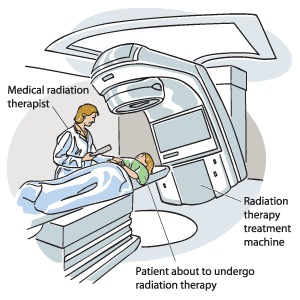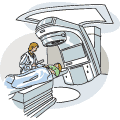Description of the procedure
Whether used alone or in combination with another treatment, radiation therapy is an option for many people with cancer. High doses of radiation are used to kill cancer cells by damaging their DNA (modules that holds the genetic information passed down during cell division). Cancer cells multiply more rapidly than normal cells, and as a result they are more sensitive to damage from radiation therapy.
Doctors use radiation therapy on different parts of the body. External beam radiation therapy uses a machine outside the body that directs radiation energy to specific area. Another form of treatment, called brachytherapy, puts radioactive implants either in or close to the cancerous tissue. Small "seeds" (which contain the radioactive material) are placed in delivery devices such as needles or catheters to be implanted. Systemic radiation therapy involves swallowing (a liquid or capsules), injecting (into a vein), or instilling (into a body cavity or space) radioactive material.
Radiation therapy takes place in a hospital or in a clinic.
When should this procedure be performed?
Your doctor or oncologist will determine the length of time and the amount of radiation you may need. Use of radiation therapy may occur before, during, or after a surgical procedure to remove a tumour. Depending on the type of cancer, combining treatment methods (e.g., radiation with chemotherapy) often improves the chances of destroying a greater number of cancerous cells.
Why is this procedure performed?
There are many reasons why radiation therapy is performed, depending on the type and severity of cancer. Radiation therapy may be used alone or in combination with other treatments (e.g., surgery, chemotherapy).
Radiation therapy may be used to:
- kill cancer cells
- reduce the size of a tumour before surgery or chemotherapy
- remove any remaining cancer cells after surgery (also called adjuvant therapy)
- help with cancer symptoms (e.g., cancer pain)
Are there any risks and precautions?
Radiation therapy treatments have several risks. Depending on the duration of the treatment (e.g., days, weeks, months), the area of the cancer, your general health status, the dose of radiation you receive, and other factors, you may or may not experience certain complications or side effects.
Although radiation destroys cancer cells, some healthy cells may also die or become damaged during the procedure. This can lead to a number of different side effects, depending on the area being treated. These may include:
- bladder irritation
- bone marrow suppression
- cough
- diarrhea
- difficulty swallowing
- dry mouth
- earaches
- fatigue
- gum and teeth changes
- hair loss
- infertility
- loss of appetite
- mouth sores
- nausea
- reduced bone growth
- skin irritation
- sleep issues
- vomiting
The health care professionals involved in your radiation therapy will talk to you about side effects, what you can do to help, and when you should call your doctor or the clinic. Side effects may last for week or months. Although not a direct side effect of radiation, you may have difficulty sleeping or feel depressed or anxious. If you experience these, tell a health care professional.
Very rarely, a new case of cancer may develop in the area that was previously treated with radiation. Usually this occurs a number of years or decades after treatment.
If you are concerned about any symptoms following this procedure, speak to your doctor. Take the time to be sure you understand all the risks of complications and side effects as well as any precautions you or your doctor can take to avoid them. Be sure your doctor understands all your concerns.
What happens during the procedure?
During external radiation treatment, a machine aims radiation energy at the cancerous tissue. The amount of energy (also called the dose) required for treatment depends on where the cancer is located and how far below the surface of the skin the unhealthy cells lie. The machine is on for only a minute or two but treatment usually takes up to half an hour. You will not feel anything during the treatment. The rest of the time involves preparation for the procedure. Treatment is often given 5 days a week for a certain period of time.
With brachytherapy, the radioactive materials are implanted in your body. This may require surgery with local or general anesthesia. Some treatments are temporary while others are permanent. Permanent implants stay in forever and release a small amount of radiation over time. Temporary implants do not stay in forever and may require that a special applicator be inserted to help deliver the radiation. Depending on the type of radiation you receive, you will need to stay in the hospital or clinic for several hours up to several days. If an applicator is used, it will be removed when treatment is finished.
With systemic radiation therapy, you will be given a liquid or capsules to swallow, an injection into a vein or have radioactive material placed into your body. You may need to stay in the hospital for a few days. You will not feel any pain or discomfort during the treatment.
Tell your doctor or prescriber about all prescription, over-the-counter (non-prescription), and herbal medications that you are taking. Also tell them about any medication allergies and medical conditions that you may have.
Ask your doctor or pharmacist whether you need to stop taking any of your medications before the procedure.
How should I prepare for this procedure?
Before having this procedure, discuss the advantages, disadvantages, long-term risks, and consequences associated with the procedure with your doctor. Be sure you fully understand what will happen and are comfortable with your doctor’s answers to your questions.
Before receiving external beam radiation, a planning session takes place using a simulator. The simulator machine helps the radiation therapist get a better look at the treatment area by taking pictures and scans. The therapist then puts small dots on the skin with permanent ink to mark the exact treatment area. The simulation can take up to an hour. During your simulation and at the time of the radiation procedure, it is very important to stay still to accurately define the treatment area and best target the cancer, and to avoid radiating healthy cells.
To treat the head and neck, a plastic mould is sometimes made to help you stay in the same position each time, so the same treatment area is always targeted. Other special equipment may also be made or used to help you stay still during the procedure, or to protect certain parts of your body from radiation.
Before brachytherapy, your may have several imaging tests (e.g., CT scan) so your surgeon and radiation therapy team can plan the placement of the implant. Usually a local or general anesthetic is used, so you may be asked not to eat or drink anything after midnight the night before the surgery. If your doctor has recommended different times, follow the timing recommended by your doctor.
There is usually no preparation required for systemic radiation therapy. Some people stay in the hospital after receiving treatment while others receive their treatment as an outpatient.
Before any of these procedures, it's also important to discuss with your doctor your overall health as well as any medications or natural health products you take. Different medications may have an effect on how you will feel after the treatment or how well the treatment works. Get a lot of rest and eat well so that your body is better able to recover from therapy.
What can I expect after the procedure?
After external beam radiation, you will likely feel no different than before the procedure. You are not radioactive after this procedure. The possible side effects listed above may occur hours or days after the treatment. After the procedure, you can return to your normal activities.
After brachytherapy, you will spend time recovering at the hospital. The radiation itself is painless, but the process of putting in the implants and applicators may cause some pain and discomfort. It may be necessary for you to take pain medication depending on your level of discomfort.
If the amount of radiation in your implant is high, certain safety precautions may be needed to protect the people around you from radiation. Discuss this with your doctor.
If you have systemic radiation therapy, you may need to stay in the hospital for a few days since some of the radioactivity will be in your body fluids (e.g., sweat, urine, saliva). After a few days, most of the radiation should be gone from your body, but you may need to take precautions, as suggested by your doctor or other health care professional involved with your radiation therapy.
Results
Your doctors will request ongoing tests during and after your treatment. Your doctor and other health care professionals will review these test results to determine if radiation therapy was successful. Often, the treatment's success is only apparent many weeks or months after it is complete.
All material copyright MediResource Inc. 1996 – 2024. Terms and conditions of use. The contents herein are for informational purposes only. Always seek the advice of your physician or other qualified health provider with any questions you may have regarding a medical condition. Source: www.medbroadcast.com/procedure/getprocedure/Radiation-Therapy



